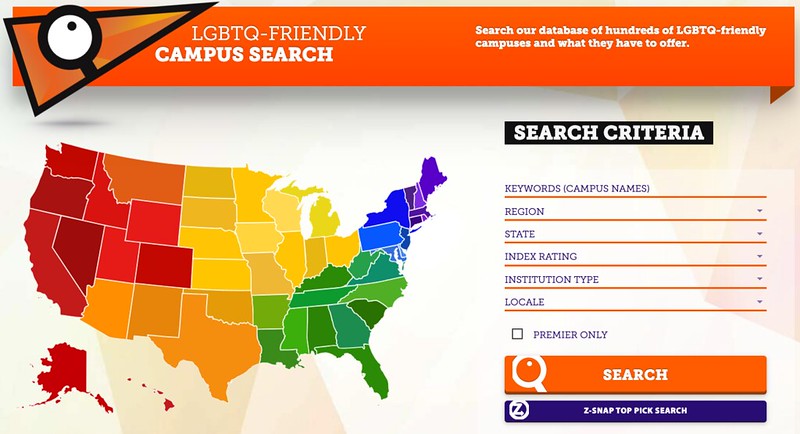How to Find an LGBTQ-Friendly College or University
Last updated March 26, 2025
When researching colleges, it's important to consider factors beyond academic offerings and financial fit. While college is a time for you to pursue your education, it’s also an opportunity to freely explore your identity, values, and beliefs as you connect with individuals who bring different perspectives, cultures, and experiences. This is particularly important for LGBTQ students, who often face unique challenges in addition to navigating college for the first time.
The good news is that many colleges and universities are recognizing the importance of inclusivity and are expanding their practices to better support LGBTQ students. So whether you identify as LGBTQ or you’re an ally looking for an environment that celebrates diversity, there are tools and strategies available to find a college that fosters a supportive community. In this article, we’ll give you some tips on how to search for LGBTQ-friendly colleges.
(Lee este artículo en español aquí!)
How to Find an LGBTQ-Friendly College or University
There are a few tools and strategies to help you get started. Online resources like Campus Pride Index offer a free and comprehensive database of LGBTQ-friendly colleges. Each college listed is ranked on a system that ranges from 1-5 stars, which reflect the college's commitment to improving the academic environment and campus culture for LGBTQ students.
You can also explore a college or university’s website to search for LGBTQ student organizations, campus centers, and resources. Another approach is to join online student groups or forums where you can engage with current students or alumni who identify as LGBTQ. Their perspectives can provide invaluable insights, helping you make an informed decision about which college will best fit your needs.
Factors to Consider
When looking for LGBTQ-friendly colleges or universities, consider the following factors:
Availability of LGBTQ Student Clubs and Organizations
Look for the availability of LGBTQ clubs and organizations, as they can offer a safe and supportive space for LGBTQ students within the larger college community. These clubs offer a chance to connect with other students who share similar experiences and can lend their support as you navigate through your college journey.
It's also important to keep an eye out for campus centers or physical spaces where LGBTQ students can study, socialize, or access staff and faculty who can provide resources specifically for LGBTQ students. These student clubs and campus centers can help you find a sense of belonging and encourage you to participate in activism and inspire social change.
Inclusivity Policies, Programs, and Initiatives for LGBTQ Students
A college's student code of conduct is a set of rules and guidelines that students are expected to follow, outlining expectations for behavior and conduct while on campus. Look for a college or university that explicitly states in its student code of conduct that discrimination or mistreatment against LGBTQ students is not allowed or tolerated. This shows that the college is dedicated to fostering an LGBTQ-friendly environment where all students are respected and valued.
It’s also important to look for campus initiatives that aim to improve the lives of LGBTQ students. One example is the availability of inclusive campus facilities, like gender-inclusive housing or gender-inclusive restrooms. Another example is gender affirming healthcare or counseling services for LGBTQ students, with knowledgeable providers who understand their unique needs.
LGBTQ Representation in Academic Programs
In addition to the campus culture, also consider the college’s academic environment to determine if it is LGBTQ-inclusive. Look for LGBTQ faculty members and explore the course catalog for majors or courses exploring LGBTQ themes, like gender studies or women's studies. Subjects like sociology, psychology, history, and political science may also offer LGBTQ-focused courses. Even if you don't plan on majoring in these subjects or taking these classes, their existence shows that LGBTQ research is valued at that college. These departments may also provide information about internships and scholarships available to LGBTQ students.
Researching colleges can be an overwhelming process, and no school will be perfect or meet every expectation. But with intentional research, you will get closer to finding a school that best aligns with your values. You deserve to be in a college environment where you feel safe, respected, and celebrated for who you are!
Have any questions about building your college list? Text #Hello to 33-55-77 to chat with one of our advisors. If you're using a mobile device, click here to have the text message set up for you!
